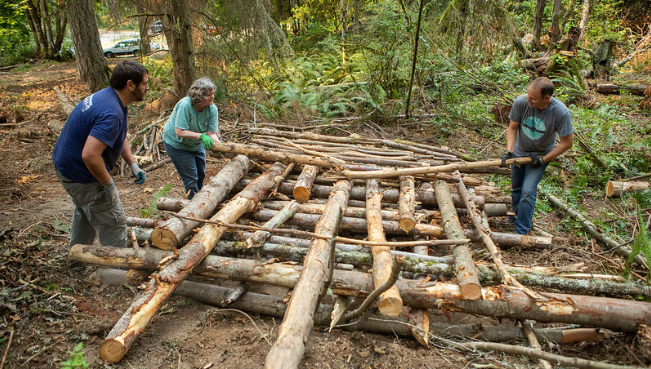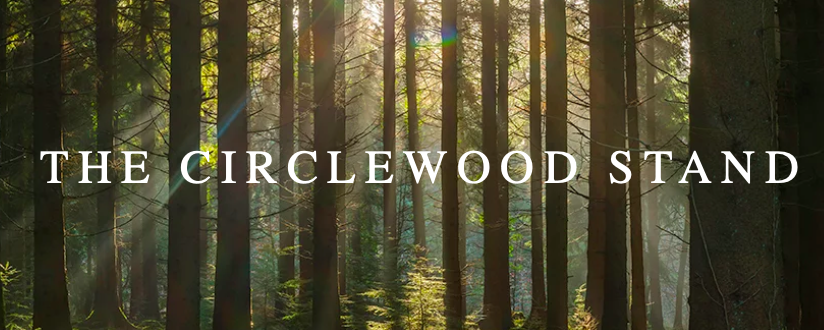As the leader of Circlewood, I spend a lot of my time communicating a vision of faith and life that moves us toward greater harmony with God, one another, and the whole community of creation. I write this weekly column, preach and teach in local churches, lecture in high school, college, and graduate school classrooms, and have frequent conversations with people who are also trying to forge a different way forward. It is meaningful and interesting work, but comes with challenges.
One of the challenges is finding the right words. How do I talk about something that is, for many people, a new and challenging perspective that has not been part of their vocabulary? When do I use familiar words and phrases as points of connection? When do I combine words into new phrases, or make up new ones, to help people break out of set patterns and ways of seeing? When do I pull in words and phrases from other cultures or languages that might open up minds and hearts to new worldviews and ways of being?
Here are a few examples of how our particular language matters.
What should we call this world that we live in?

Words create worlds - this is one of the wonderful mysteries of Genesis, where God creates with the declarative, "Let there be..." While we are not God, what we call the world certainly reflects and shapes our understanding of it.
It is common to refer to the world as the "environment." I understand that this can be helpful, but one of the drawbacks is that this is often understood as referring solely to the non-human world, as if we humans were somehow separate from physical reality. It can also feel a little reductive. One of my former pastors (and TED subscriber!), Doug Johnson, recently sent me the following quote about the word environment from Frederick Buechner, a writer known for his careful use of words:
It's too bad that such a poor word has come to refer to something so rich. The forests, the rivers, the mountains, the oceans, the deserts, the beaches, the fields, the flowers, the rain, the sky, the air. To speak of them collectively as the environment is to suggest that they are somehow lifeless and abstract. It makes it almost possible to forget that what we are in danger of ruining through our rapacity and folly is the mother who bore us and the green grave that awaits us. Is our hearts' delight. Is our home.
One alternative is the word "nature." This is certainly better at capturing the animating force of the world than the more sterile-sounding "environment," yet it typically shares the same human/non-human divide, as if we are not part of nature. And while seeing the world as nature is more conducive to engendering a sense of awe, wonder, and respect, it is still vulnerable to a utilitarian approach to the world that is stripped from any kind of deeper, moral purpose. This is the argument that my doctoral thesis advisor, Dr. Norman Wirzba, makes in his book From Nature to Creation:
Without God as Creator it simply makes no sense to think of the world as a place of divinely cherished gifts or as a divine theater in which creatures are loved by God and we are invited to play a contributing role in a drama that seeks the full flourishing of all.
This is why people of faith primarily refer to the world as creation, which not only acknowledges a religious and spiritual framework to reality, but also implies the need for a moral understanding of the world and our place within in. This leads me to another challenging question.
How do we talk about our responsibility to care for this world?

One of the most popular phrases for people of faith in reference to our moral responsibilities to the world is "stewardship." A steward is one who cares for the wellbeing of something (or someone) that is not owned by the steward. This is a helpful term in that it acknowledges that we do not own the world, and have been given a certain responsibility to care for it. But there are problems with stewardship as well. The biblical scholar Richard Bauckham points out the following:
- Stewardship can invite hubris when we overestimate our knowledge and skills in relationship to how the world works.
- Stewardship may lead us to think that the owner (God) is not really active or present in the world, and that we are, for all intents and purposes, in charge of what happens "down here" on the earth.
- Stewardship can continue to perpetuate the idea that humans are in a vertical relationship with the earth, in the sense that we exist in a hierarchy that places us above all other creatures.
Another option is the popular phrase "creation care." It has a nice ring to it, and it has certainly helped people of faith pay more attention to the needs of the non-human world. But it is quite imprecise; are we really called to care for the whole creation - the moon, stars, and distant galaxies? It also has the risk of, once again, separating humans from creation in an unhelpful way. If we are part of creation, then every act of care is creation care, whether it is planting a forest, caressing a baby, telling the government to pursue better energy policy, or telling our neighbor about Jesus. Creation care can be a helpful phrase, if we can see it as a comprehensive framework for how we embody and share the love of Christ for the whole world.
Another option is to talk about earthkeeping, which has the benefit of helping us focus on the particular part of creation - Earth - we actually can care for. Earthkeeping is a nice way of framing the particular human calling given to us in the opening pages of scripture, as long as we understand the earth to mean all the features, forces, and creatures that exist together on the planet.

What words work (or don't work) for you?
Language is, for better or worse, imprecise. Meanings shift with time, inviting us to find new and better ways to talk about our faith in relationship to the world. It is an ongoing challenge - I've shared a few of the ways I wrestle with words, and I'm curious to know what you wrestle with. I'd like to know what words, phrases, concepts, etc. are not helpful to you in your journey of "ecological discipleship" (a phrase near and dear to me!), and I'd like to know what language helps open your mind and heart in new and exiting ways.
Please share your questions and comments below, or you can always email me directly at james.amadon@circlewood.online.
With you on the Way,
James
Like what you are reading? Consider joining our supporter community, The Circlewood Stand. Click the image below to learn more.
